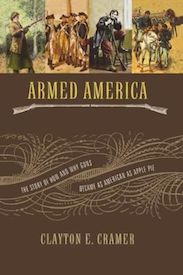Armed America
For many Americans, guns seem to be a fundamental part of the American experience – and always have been. But in 2000, Emory University history professor Michael A. Bellesiles published a startling book, “Arming America: The Origins of a National Gun Culture,” that challenged this conventional wisdom. Throughout American history, opined Bellesiles, guns were much rarer, and more rigorously controlled, than popular culture and gun-rights advocates would have us believe. Gun-controllers were beside themselves with delight, and Bellesiles was showered with accolades — including the Bancroft Prize, the nation’s most prestigious award for a history book.
Within two short years, however, Bellesiles’ scholarship would be exposed as not only shoddy but fraudulent, leading to the loss of his professorship at Emory, the revocation of his prize, and the withdrawal of his book from publication. The prime mover behind that truth campaign was Clayton Cramer, a fellow historian who had been challenging Bellesiles’ false claims ever since they began circulating in academic circles. Now, in “Armed America: The Remarkable Story of How and Why Guns Became as American as Apple Pie,” Cramer delivers the definitive answer to Bellesiles and his anti-gun supporters ? who incredibly, continue to argue that the problems with Arming America are confined to a few paragraphs.
Cramer not only debunks Bellesiles’ anti-gun myths, but takes readers along a winding historical trail full of surprising revelations and riveting anecdotes, as he explain the roots of America’s gun culture. With scholarship as sound and honest as Bellesiles’ was shoddy and deceptive, Cramer explains how common guns were in early America; what laws regulated their use; the practice, pastime, and sport of hunting in early America; and much more.
“The evidence this book examines is very clear,” writes Cramer. “Guns were a fundamental part of the American experience from the founding of the first English colonies. Americans used guns initially as tools for individual self-protection and hunting, but by the time of the American Revolution, firearms became symbols of citizenship, intimately tied to defending political rights. Gun ownership was not universal in early America — but in every period, in every region, the evidence from written accounts, from probate inventories (the documents assessing the value of an estate after a person’s death), from archaeological digs, and from official records demonstrates that gun ownership in our nation’s early history was the norm — not the exception.” You’ll discover:
- How Bellesiles repeatedly misquoted and misrepresented primary sources— even changing the text of the federal Militia Law of 1792 to exactly reverse its meaning
- How every American colony required free man to own guns for militia duty — requirements that continued when the colonies became states
- How, in at least six colonies, the duty to be armed included bringing guns to church and other public meetings, or while traveling
- How restrictions on gun ownership in early America was based solely on who could be trusted (criminals, most Indians, and some— but not all— slaves need not apply)
- How, contrary to Bellesiles’ phony scholarship, official records and personal prove overwhelmingly speak that guns in early America were widely owned and inexpensive
- How gunpowder production figures reveal that guns were not only widely owned ? but often used
- Proof that hunting was not only central to the survival of the colonists ? but a national pastime as well
- The absurd— and easily disproved— claim that Americans were desperately short of guns at the start of the Revolution, and had little or no competence with them
- Proof that Revolutionary gun manufacturing was an expansion of an established pre-Revolutionary industry
- How the “bewildering array” of gun types and calibers in the Continental army reflected the diversity of privately owned hunting weapons
- How, in early America, private gun ownership symbolized both one’s individual rights and one’s duties in defense of the community
- How, contrary to Bellesiles, eyewitness and newspaper accounts demonstrate that handguns were commonly carried in at least some parts of the U.S.— and that their presence was never a surprise
- Irrefutable evidence that hunting was common throughout the U.S., and near-universal on the frontier, and not just among the upper classes, as Bellesiles falsely claims
Tags: Armed America, Clayton Cramer
- The Author

Clayton Cramer
Clayton Cramer was born in Everett, Washington, but grew up primarily in Southern California, graduating from Santa Monica High School […] More about Clayton Cramer.














